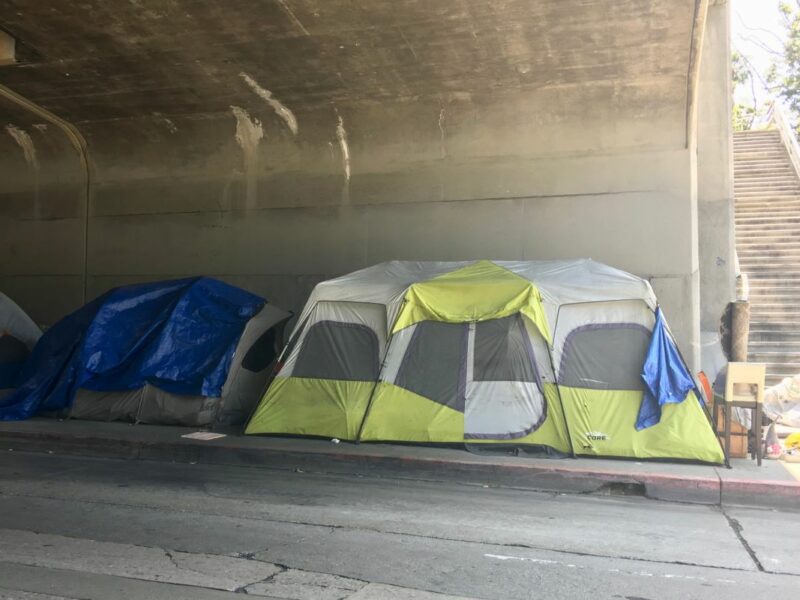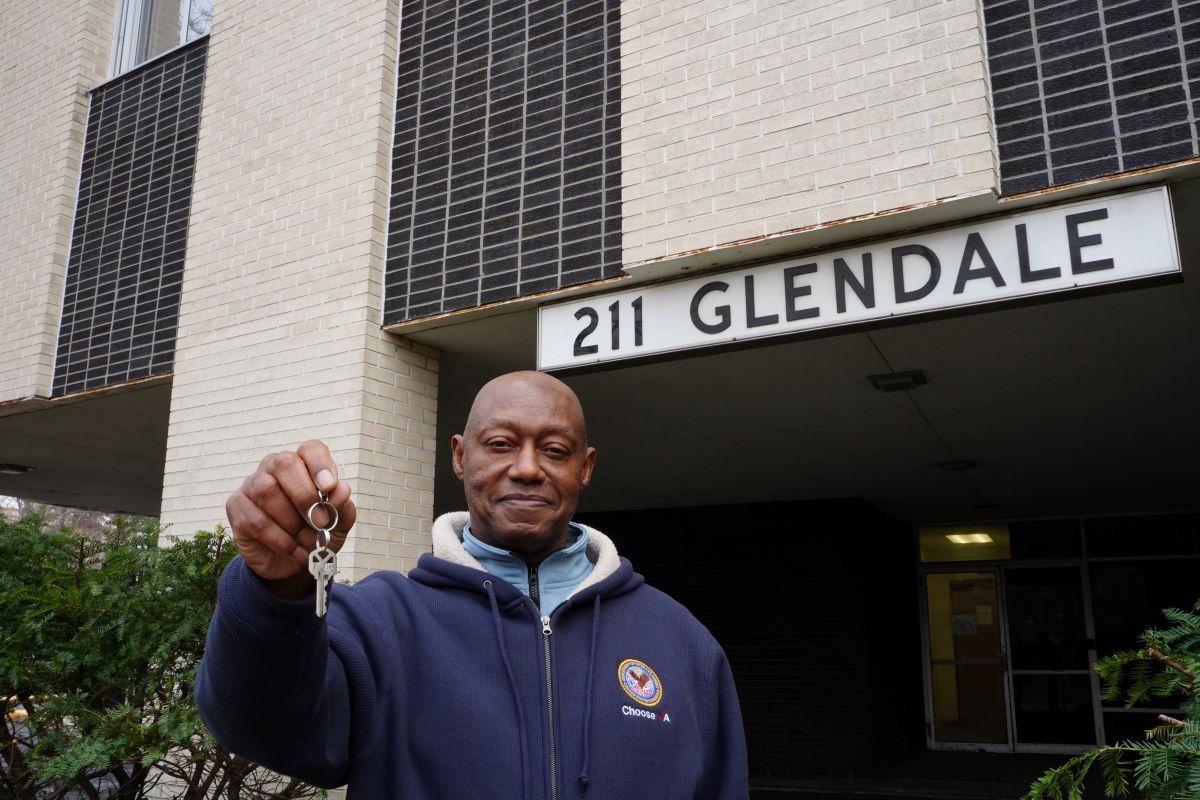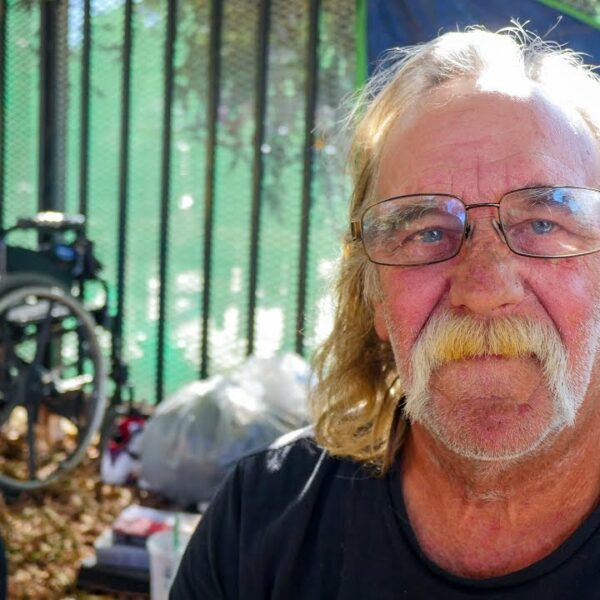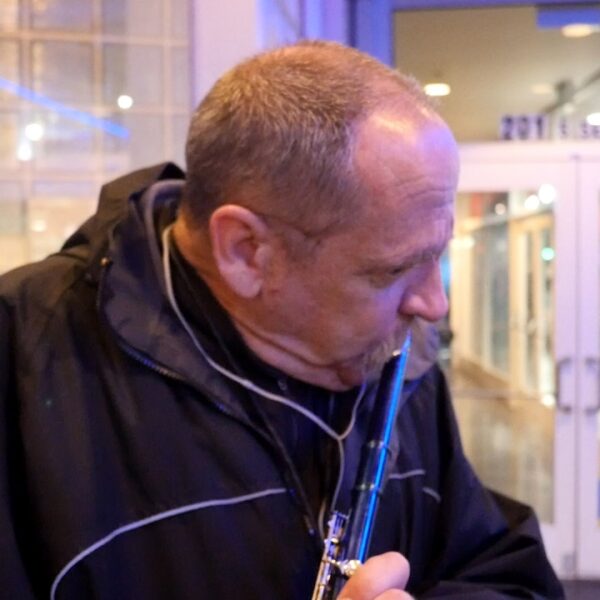New Residents Call Them ‘a Blessing’
Sixty new permanent housing units are available to veterans exiting homelessness in Detroit’s Highland Park neighborhood.
The units at 211 Glendale were recently converted from a supportive housing complex into permanent units that can support up to 60 formerly homeless veterans. The renovations included:
- Adding small kitchenettes.
- Upgrading lighting fixtures.
- Freshening the laundry room.
- Updating the community room.
The project was supported by $1 million donations from the Rocket Community Fund, the philanthropic arm of Rocket Mortgage, and The Home Depot Foundation, as well as a grant from the US Department of Veterans Affairs.
“People tend to be very passionate about helping Veterans for only a few months or holidays out of the year,” Dr. Chad Audi, CEO of the Detroit Rescue Mission Ministries, which operates the property, said in a statement.
“After that, they sort of fade into the background. In addition to our other year-round Veteran assistance programs, initiatives like this one will ensure our soldiers are housed and supported year-round and give them the tools to recover their lives and independence, which is always our end goal,” Audi continued.
The project comes at a critical time as Detroit continues its efforts to move homeless veterans into more stable housing.
Data from Community Solutions, a nonprofit advocacy organization, shows that Detroit has reduced its number of veterans experiencing homelessness by 50% since 2018. That represents about 1,175 veterans finding new homes during that time.
Nadine Maleh, a housing systems director at Community Solutions, told Invisible People that the new housing units at 211 Glendale are the result of many local organizers advocating on behalf of veterans experiencing homelessness.
For example, the local Volunteers of America chapter helped veterans find stable housing during the pandemic. Other nonprofits like Homes for Heroic Veterans, which matches homeless veterans with temporary housing, have been active in the metro area as rates of veteran homelessness in Detroit decreased by 10% between 2020 and 2021.
Maleh added that 211 Glendale’s nontraditional housing model is what separates it from similar projects. Community Solutions has helped set up similar housing arrangements for veterans in other cities like Jacksonville, Florida, and Santa Fe, New Mexico.
Instead of simply giving formerly homeless veterans a roof over their head, Maleh said 211 Glendale was designed to help keep these veterans in touch with social services. This happens through a program that Community Solutions calls “Property Management Plus,” whereby landlords are empowered to help coordinate services for their residents.
211 Glendale also looks and feels like a traditional apartment complex, Maleh said. She added that this could help veterans feel a sense of normalcy at home and inspire them to build new relationships within the community.
“This is a way to start to rethink how we support veterans in our communities,” Maleh said. “Addressing veteran homelessness can feel like an insurmountable task because there are quite a few steps to take, but it can be done.”
Freddie Tucker was one of the first people to move into 211 Glendale.
After serving three years as a military police officer, Tucker found work as a laborer in warehouses in Georgia and Michigan. However, his fortunes turned after his first wife died of a stroke in 2010. He later found himself in another relationship that drained him financially, and he wound up sleeping on the streets.
“I just never recovered,” Tucker told Invisible People.
Tucker added that there were nights when he would get off work and go sit in a local park for a couple of hours before making his way to one of the local shelters. He typically stayed at the Michigan Veterans Foundation shelter in the Core City neighborhood. But he said he always had faith that his fortunes would turn around.
They eventually did when he got the keys to his apartment at 211 Glendale. He said the apartment is about the size of a small studio, and he pays about $670 per month for rent and utilities. For comparison, the average rent for a 1-bedroom apartment is about $1,200 per month, according to RentCafe.
Tucker added that one of his favorite things about his apartment is the 55-inch television he keeps near his queen-sized bed. He has aspirations of moving into a larger apartment someday, but for now, he’s content laying on his bed and having a relaxing evening while watching television.
“It’s truly been a blessing coming here,” Tucker said. “I’m living today just like I would if I owned a mansion because I’m so grateful.”
How You Can Help
The pandemic proved that we need to rethink housing in the United States. It also showed that providing targeted support for different groups experiencing homelessness is one of the most effective ways to end homelessness for good.
That’s why we need you to contact your officials and representatives. Tell them you support converting unused properties into supportive or permanent housing programs. They have proven effective at keeping formerly homeless people housed, which is the first step to ending homelessness.













